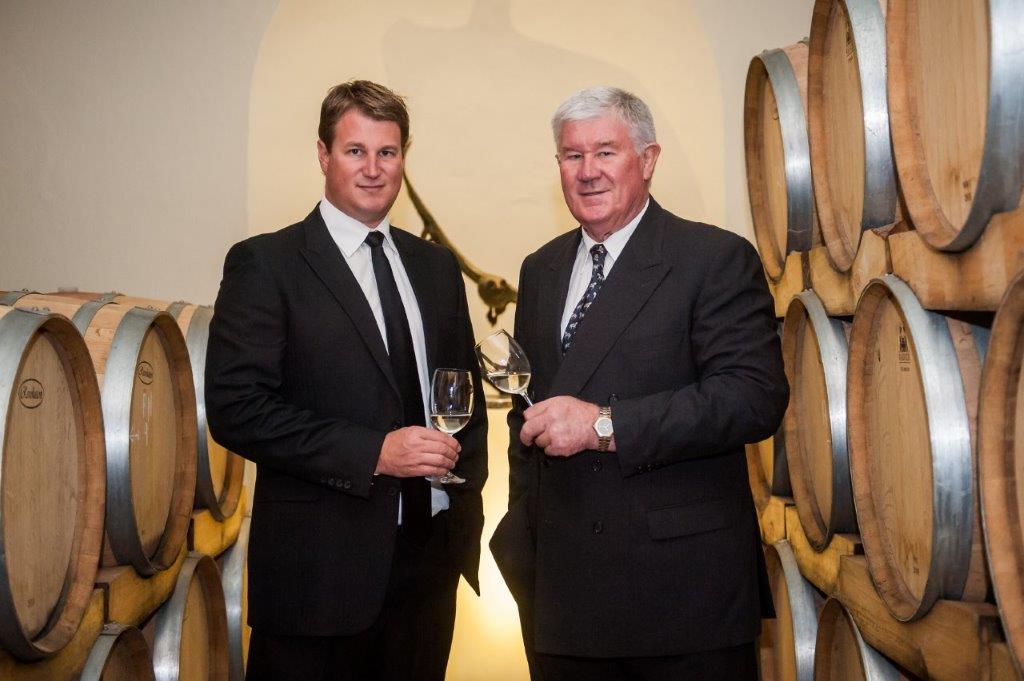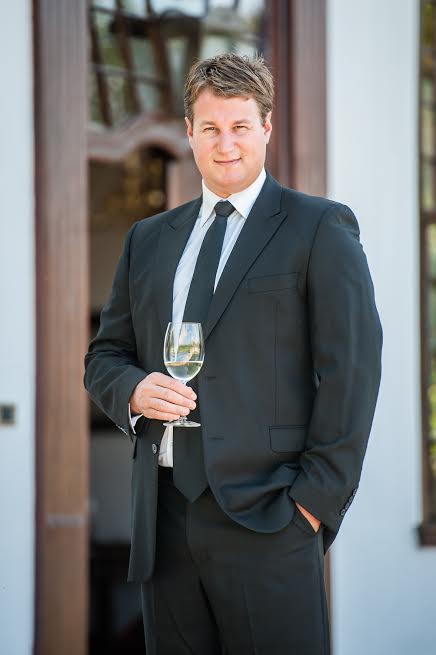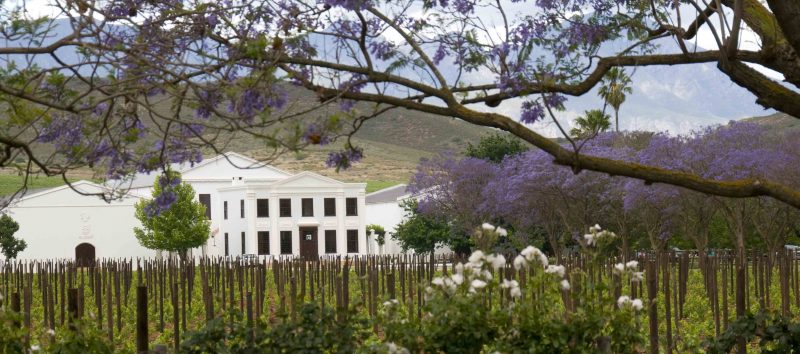Top image: Johann de Wet and Danie de Wet.
Johann de Wet from De Wetshof Estate was recently named the Agri Western Cape and Santam Young Farmer of the Year. Samantha van den Berg reports for Die Burger newspaper where she is agriculture editor.
The decision to join the family farm came naturally, says Johann de Wet (35) in the boardroom of the iconic De Wetshof Wine Estate in Robertson. It is a crisp winter morning and a fire glows warmly in the entrance to the winery building.
This is his favourite time of year on the farm Johann says of the place where he and brother Peter played cowboys and crooks in the vineyards, as well as experimenting with making their own wine while still at primary school. And it is here where he could watch his father, the legendary Danie de Wet, go about his business and in the process learning what he can about the world of wine.
Today Johann is CEO of De Wetshof, an estate famous around the world for its terroir-driven wines, especially the range of five Chardonnays. Some 200ha of vines are planted in the De Wetshof soils, 70% of which is Chardonnay. Johann is not only involved in the vineyards and with cellar management, but also finds himself firmly at the helm of marketing De Wetshof’s wines. He spends at least one-third of the year abroad and has just returned from a business trip to America. He could thus not be present at the occasion of him being awarded Agri Western Cape and Santam Young Farmer of the Year, having to tune into the function via Skype.
Then and Now
Johann matriculated at Paarl Boys High School, joining the De Wetshof team after his studies and a few work stints abroad. Back home he was exposed from the outset to all aspects of the farm’s operations in preparation for him taking up the reins.
“My father told me that if I wanted to take over the business, I have to understand every single aspect of the farm and of farming,” says Johann. “For two years I worked in each section of the farm. From the vineyard to the cellar and onto marketing. My passion lies in farming as well as marketing.”
He says he was from the outset committed to furthering the success his father and grandfather – also Johann – achieved on De Wetshof. “From when we were kids my brother and I agreed that he’d make the wine and I’d sell it,” says the father of two.
A keen equestrian who competed for the South African National Team, Johann also trained American saddle-bred horses. “It was a great hobby, but was never going to be a profession in the place of wine-farming.”
A Day in the Life
Johann is quick to point out that although he daily has to keep juggling many balls, he is only able to do so successfully with the help of a strong team.
“I have to ensure that I actually have better people than I can afford working in the vineyard and in the cellar, on the bottling line and in marketing and sales,” he says. “The team has to be strong and secure, and must keep juggling those balls through the air when I am not around.
“On De Wetshof we don’t follow a ‘I do it all’ approach. We are one team, working towards a goal with each player knowing what that goal is, and what is expected of them.”
Johann has subsequently set about compiling a team of people to realise the vision held by his father, as well as helping him to reach his objectives. “My grandfather began it all on De Wetshof,” he says. “Then my father found certain things not to be working and began focussing on wine instead of the mixed-farming being practised when he took over. I aim to take it one step further and ensure that my kids improve on that.”
Working Together
Johann believes that a family farm is one of the strongest business units. “Decisions are made quickly,” he says. “There are no bureaucratic systems you have to navigate your way through – everyone knows what the plans and the end-goals are. We eat together, socialise with one another and grow together – everyone knows where the business is heading. This is not necessarily the case in corporate environments.
“Having said that, a family farm has its challenges and each member must know what his or her responsibilities are.”
It might sound intimidating having to fill the shoes of a wine legend such as Danie de Wet, but Johann says he finds it an honour and a great benefit to walk along that path.
“Being his son I was privileged to grow up in conversations around wine held by some of the giants of the local and international industries,” he says. “I don’t think many of my peers were as privileged in this regard. I think I have a pretty good understanding of industry politics and of the country’s wine history as I had been made part of high-level discussions from an early age.”
Danie, says Johann, had his own plans for the business and now the eldest son has his. “He understands where I want to go with the business and is behind me all the way.”
He says he still gets the best advice from his father and mother Lesca due to the years of experience they have had in the industry and with establishing De Wetshof as it is today. There is also a strong belief in surrounding himself with experts in various facets of viticulture, wine production, finance, marketing and human resources.
Looking to the Future
Johann sees De Wetshof as the Chardonnay House of South Africa. “We must be recognised as the voice of this grape variety – from the wine itself, clone selections and vineyard practices,” he says. “We should not be focussing on viticulture, but on viticulture in that one single variety. We must be the masters of that one singular aspect.
“This is what we do each day on De Wetshof – realising that vision and strengthening it even further. I always say: we make Chardonnay and the rest is a floral arrangement. I don’t think you can be the master of everything. Focus….do one thing, and do it well enough to be the leader in that field. If, for example, someone wants to discuss Chardonnay clones, they have to come and talk to us.”
Looking Abroad
For Johann, the major challenge facing the industry is improving the image of South African wine in international markets and ensuring better prices.
“Wine is the product with the strongest connection to its country of origin,” he says. “If you are selling an apricot or an orange, it ends up on the shelf as an apricot or an orange. When selling wine, you are first and foremost selling your country.”
Negative publicity and political storms affect wine sales 100%. “No one is going to buy our wine out of sympathy,” says Johann. “Buyers will simply say, ‘gee but that country is a mess, don’t even think about buying its wine’. Unfortunately this is something you cannot walk away from.”
And the perception of South Africa’s wines standing in the “cheap and cheerful” category hurts.
“The perception is that South Africa’s wines are inferior to those from France and Italy, for example. This makes it important that people get to taste our wines. Once they realise the quality, we’ll be there. A turn-around is coming, it’s just a matter of time.”
About the low prices local wines realise in foreign markets, Johann says South Africa only has itself to blame. “We began selling our wines too cheaply and once that happens, you start competing against yourself. Cheap and cheerful is the result, and then no-one takes you seriously.
The solution, Johann says, is for the wine industry to work together in raising prices.
With regards to marketing our wines internationally, Johann says niche varieties are not the way to go. A greater focus is needed on cultivars such as Chardonnay, Sauvignon Blanc, Merlot and Cabernet Sauvignon, wines that the world drinks.
“We have to focus on South Africa as a category and not a variety inside a category,” he enthuses. “We can’t be pushing for wine lists in overseas restaurants that only offer Pinotage and Chenin Blanc. People want other wines, and therefore we need to build the South African category and not the cultivar.”
Acknowledging Young Farmers
He says it is a huge honour to receive recognition such as that accorded to the Young Farmer of the Year. “The competition means a lot for the wine industry as a whole,” he says. “It is common knowledge that the wine industry is struggling and we don’t receive the attention that the citrus sector, for example, is getting. This award says the wine industry is doing something right.”






